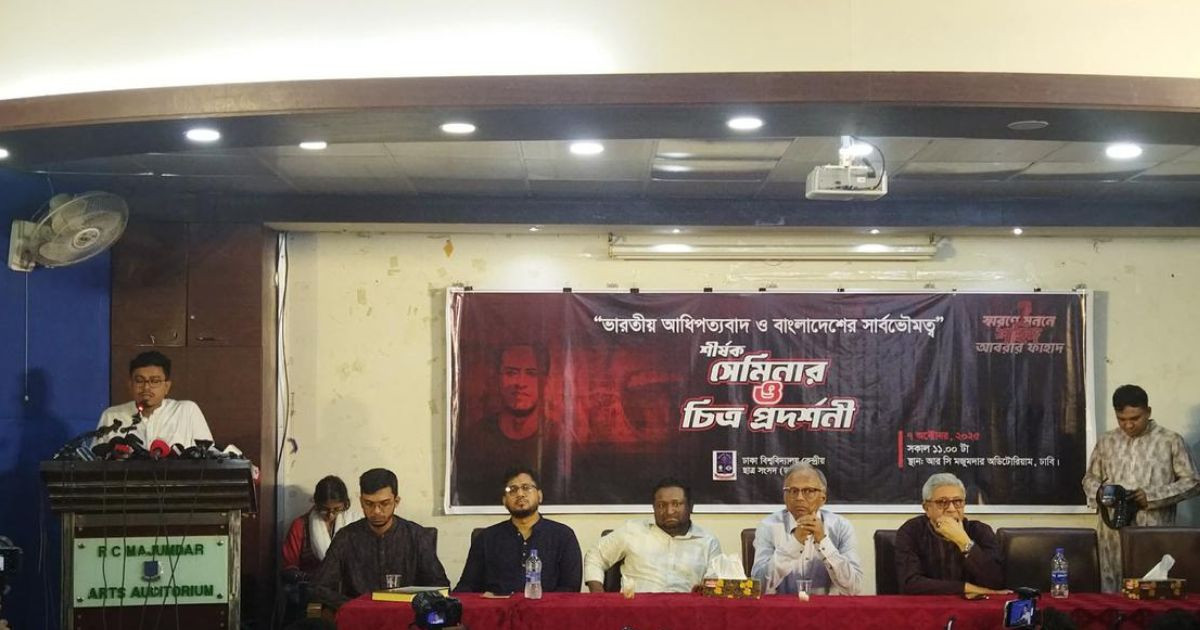Abrar Fahad a symbol of sovereignty, say speakers
Daily Sun Report, DU
Published: 08 Oct 2025

Photo: Daily Sun
Writers, political figures, and student leaders have remembered Abrar Fahad, a BUET student who was brutally tortured to death by leaders and activists of the now-banned Bangladesh Chhatra League at the university’s Sher-e-Bangla Hall, dubbing him a symbol of Bangladesh’s sovereignty and a beacon of anti-hegemonic consciousness.
They made these remarks at a seminar titled “Indian Hegemony and Bangladesh’s Sovereignty: Remembering Martyr Abrar Fahad” organised by the Dhaka University Central Students’ Union (DUCSU) at the RC Majumder Auditorium of Dhaka University on Tuesday.
Speakers at the event said that Abrar is no longer just a name or an individual, but a living symbol of resistance against foreign aggression and hegemony. His martyrdom marked a turning point in national politics, inspiring a new wave of youth activism against Indian dominance and planting the seeds of the July Mass Uprising, they said.
Discussants emphasised that the rise of patriotic youth like Abrar demonstrates the urgent need for united resistance among the country’s millions of young people to safeguard national sovereignty.
Calling for unity beyond party lines and ideological divides, the speakers urged all to uphold Abrar’s spirit and build a truly independent and sovereign Bangladesh.
Abrar's father Md Barkat Ullah said, “Abrar Fahad's Facebook post was in favour of the country, the soil and the people of the country. But it was because of his Facebook post that he was brutally killed.
“My only wish is that in the future Bangladesh, no one should be a victim of such brutal murders like my son. If you shoot a person, he dies quickly, and the pain is less. But the incident of killing people by beating them all night long should not return to this country.”
Abrar Fayyaz, brother of martyr Abrar Fahad, said, “It has been six years since my brother was killed, but we have yet to get any justice. However, Abrar Fahad did not belong to any party or ideology.
“Isn't six years enough to prosecute a murder case? We are upset with the judicial system of this country.”
Presiding over the seminar, DUCSU Vice-President Abu Shadik Kayem said, “Shaheed Abrar Fahad has energised the young generation of this country in a new way. From his protest and resistance, we have learnt how to speak against hegemony and aggression, and how to ensure justice.
“The seeds of the July Revolution were originally sown by Shaheed Abrar Fahad. After his martyrdom, a generation was born across every campus in Bangladesh. We witnessed the Safe Road Movement and many others since then, culminating in the consensus that led to the July Revolution.”
Inqilab Mancha spokesperson Sharif Osman Hadi said, “We will not commemorate Abrar merely because he became a martyr and envisioned a new Bangladesh. Today, aggression and hegemony are advancing towards Bangladesh with a hundredfold force.
“If they come again to our independent borders, millions of Abrars must rise – not only in BUET but across every educational institution in the country. To establish an independent, sovereign Bangladesh, we will need countless Abrars — not for any party, but for the whole nation.”
Writer Rezaul Karim Rony said that the root of Bangladesh’s problem of sovereignty lies in its geopolitical orientation.
“The foundation of our foreign policy has been built to appease India. This is why the notion of a ‘friendly state’ was invented. There is no such concept in international politics - states are formed through the perception of others as different or even adversarial. However, the dominance of Indian Bengali nationalism has been normalised in our cultural and literary narratives, where being one-sidedly friendly is portrayed as a virtue,” he said.
Rafe Salman Rifat, chief organiser of United People’s Bangladesh, described Abrar as “a great symbol who fought against fascism and Indian hegemony and embraced martyrdom”.
He added, “Following his death, the student community gradually united against the politics of dehumanisation and hatred, which eventually culminated in the July 2024 mass uprising.”
Abrar’s father, Barkat Ullah, inaugurated the seminar. Other notable speakers included Prof Mohammad Abdur Rab, vice-chancellor of Manarat International University; Mahmudur Rahman, editor of Amar Desh; and Sirajul Islam, former president of Islami Chhatra Shibir.

